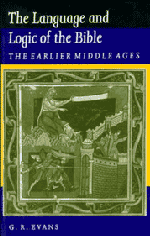Book contents
- Frontmatter
- Contents
- Preface
- Acknowledgements
- List of abbreviations
- List of ancient and mediaeval sources
- Biographical notes
- Introduction
- Part I The background
- Part II Lectio: surface and depths
- 4 Words and things and numbers
- 5 The historical sense and history
- 6 Exegesis and the theory of signification
- 7 Transference of meaning
- Part III Disputatio
- Conclusion
- Notes
- Select bibliography
- Index
6 - Exegesis and the theory of signification
Published online by Cambridge University Press: 01 June 2011
- Frontmatter
- Contents
- Preface
- Acknowledgements
- List of abbreviations
- List of ancient and mediaeval sources
- Biographical notes
- Introduction
- Part I The background
- Part II Lectio: surface and depths
- 4 Words and things and numbers
- 5 The historical sense and history
- 6 Exegesis and the theory of signification
- 7 Transference of meaning
- Part III Disputatio
- Conclusion
- Notes
- Select bibliography
- Index
Summary
The theory of signification
We have seen how the early mediaeval theory of signification rests upon two accounts: Augustine's talk of words and things and signs in his De Doctrina Christiana and Boethius' discussion in his commentaries on Aristotle's De Interpretation. Boethius approaches his subject, as Aristotle does, by distinguishing mere noise from those sounds we call words: a word is ‘meaningful, signifying something by itself’; it is a vox significativa per seipsam aliquid significans. A sound is a ‘word’ only if it means something.
Boethius goes on to explore the nature of the link between the word and that which it signifies. He explains that every time we use language we are concerned with a chain: of things (res) which we want to talk about, ‘understandings’ (intellectus) with which we perceive and discern them in our minds, and the voces or words with which we signify that which we have grasped by understanding. If we want to record those words in written form, we shall also need letters (litterae or notae) with which to signify the words. Thus, the letters signify the words, the words signify what is understood, and the understanding grasps the things.
In this chain of signifying, the letters and the words are arbitrarily chosen and ‘imposed’ upon the things. They may vary from language to language; but the intellectus, the concept, and the res, the thing signified, are natural and everywhere the same.
- Type
- Chapter
- Information
- The Language and Logic of the BibleThe Earlier Middle Ages, pp. 72 - 100Publisher: Cambridge University PressPrint publication year: 1984



